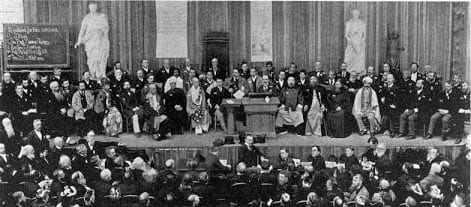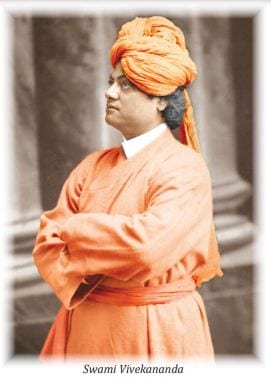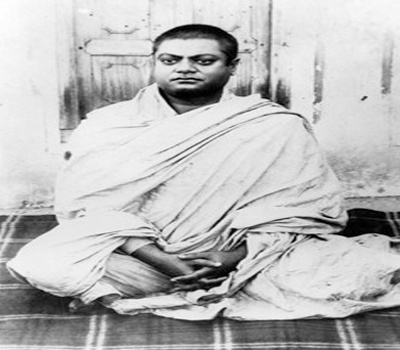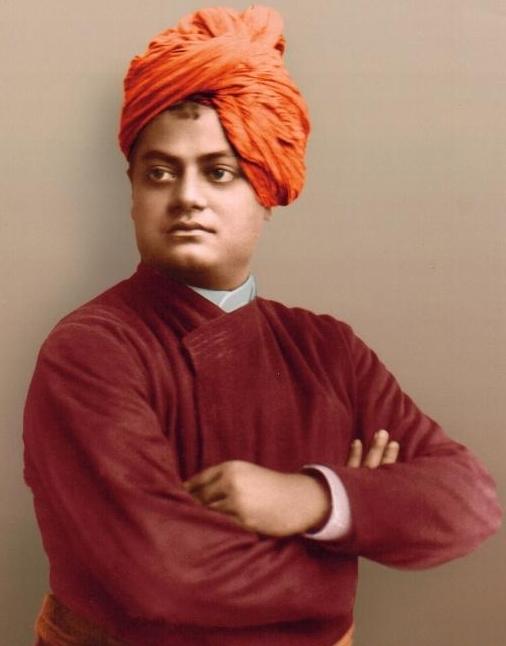From time immemorial freedom has been the most sought after and treasured value. For Swami Vivekananda, freedom is both an ontological as well as moral ideal. He points out, ‘The greatest goodness is the highest freedom. Our aim should be to allow the individual to move towards this freedom.’1
Freedom from What?
The analysis of freedom first raises the question, freedom from what? Swami Vivekananda asserts that the idea of freedom is the only true idea of salvation. It is freedom from the clutches of senses, from the vagaries of the mind, from the dualities of life like pleasure and pain, good and evil, from death and from the life itself that begets death. Everything in time, space, and causation is bound and this is called nature. But the soul is beyond all time, all space, and all causation. All nature is bound by law, the law of its own action; and this law can never be broken. He who attains freedom breaks the bonds of nature, and for him nature fades away and has no more power over him. This is salvation or liberation.
Why Freedom?
Why should freedom be sought? Swami Vivekananda says that everything that we perceive around us from the lifeless particle of matter to the human soul is struggling for freedom. All that we see in the universe has for its basis this one struggle towards freedom. It is under the impulse of this tendency that the saint prays and the robber robs. When the line of action is not proper we call it evil, and when it is otherwise we call it good. But the impulse is the same — the struggle towards freedom. The freedom that the saint seeks leads him to the enjoyment of infinite, unspeakable bliss. When the robber steals he gets the same happiness as the saint; but it is only a speck of what the saint experiences and moreover it is followed by a mass of misery. Real freedom is happiness and perfect freedom is God. The effort to attain freedom underlies all forms of worship. Swamiji proclaims that freedom is the motive and the goal of the universe. This universal struggle for freedom attains its highest expression in man in the conscious desire to be free.
The Aftermath of Freedom
What becomes of a man when he attains perfection through perfect freedom? Swamiji declares that he enjoys infinite and perfect bliss having obtained the only thing worth longing for, namely God. When a man becomes free he will be more active than any other being because while others act under compulsion he acts through freedom. All the great systems of ethics preach unselfishness as the goal. When a man achieves this goal, through freedom, he is no more a little Mr. So-and-so. He has an infinite expansion. Swamiji declares that the goal is to detach the soul from all things, mental and physical. When this freedom is realized, the soul finds that it was alone all the time and it requires none to make it happy. Salvation means knowing this truth. We do not become anything; we are what we are.
How to Attain Freedom?
In Swamiji’s philosophy, freedom is attained by the threefold means of work, worship, and knowledge. (a) Work — constant, unceasing effort to serve others and love others. (b) Worship — prayer, praise and meditation. (c) Knowledge — that which follows meditation. Swamiji declares that unselfish work, worship of God and the holy ones, concentration and meditation are the ways of breaking away from Maya’s net. But we must first have the strong desire to get free. The flash of light that dispels darkness is within us; it is the knowledge that is our true nature. All that we have to do is to blow away the clouds that cover it. Man is already free, but unaware of it. So he will have to discover it. This discovering, consciously or unconsciously, is the whole life of each one of us. The difference between the sage and the ignorant man is that one does it consciously and the other unconsciously. In Swamiji’s words, ‘We are ever free if we believe it, only have faith enough. You are the soul, free and eternal, ever free, ever blessed. Have faith enough and you will be free in a minute. Everything in time, space, and causation is bound. The soul is beyond all time, all space, all causation. That which is bound is nature, not soul. Therefore proclaim your freedom and be what you are—ever free, ever blessed’.2
To acquire freedom we have to go beyond the limitations of this world. Perfect equilibrium, or what the Bible calls the peace that passeth all understanding, cannot be had in this world, nor in heaven, nor in any place where our mind, and thoughts can go, where the senses can feel, or which the imagination can conceive. No such place can give us perfect freedom, because all such places are limited by space, time and causation. He alone, who is always awake to the idea of freedom, becomes free; he who thinks he is bound, endures life after life in the state of bondage.
Law and Freedom
Freedom primarily refers to the overcoming of base animalistic instincts in a human being. It is the conquest of lower laws through the higher ones. But even here, the conquering mind is only trying to be free; and as soon as it finds that the struggle is also through law, it seeks to conquer that too. So the ideal is freedom in every case. The trees never disobey law. An oyster never told a lie. Yet they are not greater than man. Eternal law cannot be freedom, because to say that the eternal is inside law is to limit it. There is no purpose in view with God, because if there were some purpose, He would be nothing better than a man. Just as the greatest emperors sometimes play with dolls, so God is in play with this nature; and what we call law is this. We call it law, because we can see only little bits which are orderly. In God and freedom we began, and freedom and God will be the end. These laws are in the mid strata through which we have to pass. Vedanta is the assertion of freedom always. The very idea of law will seem antithetical to the Vedantist; and eternal law is a very dreadful thing for him, because there would then be no escape. If there is to be an eternal law binding him all the time, where is the difference between him and a blade of grass? The ignorant man is satisfied if he can get freedom within a certain limit—if he can get rid of the bondage of hunger or of being thirsty. But the sage feels that there is a stronger bondage that has to be thrown off.
Absolute and Relative Freedom
In the philosophy of Swami Vivekananda, freedom has a wide connotation. He speaks of freedom in both absolute and relative terms. Absolute freedom stands for spiritual freedom. It is inseparable from the essential nature of man. It is not a mere abstraction. It has a definite individual and social connotation. The individual and the society must move up to freedom. Human beings aspire for many higher things of life which society cannot itself provide. However society can help a person to realize these higher goals. Any society becomes truly civilized only when it encourages greater individual freedom. Belief in the absolute or spiritual freedom made Swamiji assert that individual freedom is no threat to social freedom. Individual freedom helps a person to identify himself with society and such a person would in turn encourage and pave the way for the realization of individual freedom in others. ‘Freedom’ Swamiji says, ‘is the only condition of growth, take that off, the result is degeneration’.3
Relative freedom stands for the social and political freedom of man. Breaking privileges and elimination of all propitiations is Swamiji’s view of freedom in its social character. Every privilege is a hindrance on the journey to freedom. Swamiji has enriched the Indian concept of freedom, which is essentially spiritual, by incorporating into it the ideas of western social and political liberty. In his philosophy, internal and external freedom are fused into one thereby providing for the full growth of the individual personality. Swamiji could not accept the idea of sacrificing individual liberty for social supremacy. He said that a society cannot be called so which is formed by an aggregate of human beings who are like lumps of clay or lifeless machines. The democratic ideal of individual liberty is held in high esteem in his philosophy of Vedanta. He was also not for the individualism of the nineteenth century which was characterised by an absence of restraint. For him liberty meant the natural right to be allowed to use our body, intelligence or wealth according to our will, without harming others. This is a socialistic interpretation of liberty, where liberty is not a negative concept but a positive one, where it refers not to absence of restraints but to positive opportunities. He believed that even though laws are indispensable for social life, too many of them can only destroy liberty. He observed ‘This life is a tremendous assertion of freedom, and this obedience to law carried far enough, would make us simply matter – either in society, or in politics or in religion… Whenever in any society there are too many laws it is a sure sign that society will soon die’.4 However this is not to be construed as favoring the abolition of laws in social life, for he said that when we live in society, we have to comply with its rules and regulations. Swamiji’s approach is similar to the General Will of Rousseau who combined social life with the freedom of the individuals.
In Swamiji’s philosophy, liberty is interchangeable with equality. Liberty stands for the removal of all the shackles that hinder the manifestation of the true nature of individuals. These shackles are created by ignorance and ignorance leads to all kinds of privileges and inequalities. In the state of self-realization, one attains full liberty and he perceives the reality of oneness of existence.
Conclusion
Indian society is in a state of transition and metamorphosis. Living conditions have changed considerably over the years. The exponential growth of Information Technology has exposed our society to global cultures and value patterns. Reactions to this exposure have been manifold. On the one hand we find a strong line of resentment to native values rising among the youth who are carried away by the new lifestyles and values of a globalized society and who rebel against the ethnic Indian culture, lifestyle and value systems. They decry and look down upon anything Indian. On the other hand we also come across those who fervently attempt to guard themselves against all winds of change; who are suspicious of anything that attempts to bring a change in the society. Caught between these two extremes the average Indian is generally confused and is like a ship that has lost all sense of direction. In such a situation we need role models and intellectual icons to fall back upon and to draw inspiration and seek direction to guide our lives safely. Swami Vivekananda provides that most needed light and direction to our society. In him we find the perfect synthesis of modernity and tradition, and rationalism and intuitionism. In a society where freedom is often confused with capriciousness and chaos, Swamiji gives us a true insight into the concept of freedom. He sends across a strong message that freedom is not lawlessness, and certainly not indulgence; it is mastery over the senses and mind. Sensual indulgence is nothing but slavery to the senses that makes our mind and body fickle and weak. Strength and purity are for him the watchwords. At the same time he does not take an uncritical attitude towards the Indian society. He strongly denounces evils like caste and superstitions.
The search for freedom is one of the most basic urges of a human life. This urge when properly channelized and directed leads to everlasting freedom and blessedness. Swami Vivekananda helps us to tread the real path towards freedom and pursue it to its culmination.
References
- Swami Vivekananda, The Complete Works of Swami Vivekananda, Vol. VI, 1947. p.66
- Ibid.p.66.
- Swami Vivekananda., State Society and Socialism, Advaita Ashrama, Calcutta, 1989, p.124.
- Swami Vivekananda, The Complete Works of Swami Vivekananda, 1963, Vol. V, p.287.
We are continually making this mistake; we are regarding nature as ourselves and are becoming attached to it; and as soon as this attachment comes, there is the deep impression on the soul, which binds us down and makes us work not from freedom but like slaves.
—Swami Vivekananda
Source : Vedanta Kesari, September, 2016







Leave A Comment